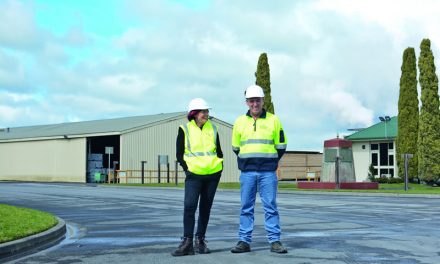CARVING OUT A HISTORY
They may be the second largest hardwood processing company in Tasmania, but McKay Timber remains family-owned and operated, employing in excess of 100 people. McKay Timber is one of the most highly recognised timber legacies in Tasmania – and Australia.
With an illustrious history, the success of the business is a true testament to the family behind the name.
From humble beginnings in 1947, Alexander McKay – who had then been working in Tasmania’s timber industry since the tender age of 17 – went out on his own to start a timber agency and milling business called W.A McKay located in the southern Tasmanian suburb of Rosetta.
Shortly after that, the business moved to the suburb of Glenorchy, where it still stands today. This was where I met with Bernard, Alec’s son, who has worked in the family business since the 1960s.
In addition to the Glenorchy timber processing and truss business, today McKay’s owns and operates their sawmill in Bridgewater (upgraded and re-opened earlier this year), just outside of Hobart, and they also have a timber truss factory and timber distribution facility up north in the city of Launceston.
With such a dominant presence within Tasmania’s timber industry, and for so many years, I was curious to discover the secrets to the McKay family’s success.
Speaking with Bernard in his timber-furnished office, it’s clear that this isn’t just a day job, but an enriched component of who he is. His surname alone is one synonymous with Tasmania’s rich and, at times, controversial timber industry – due to its relationship with the native hardwood forestry industry.
“I was working here before, when I was only about 18, doing maintenance work and so on. Then I went to the mainland for a couple of years and had a look around – trying other things – but I was drawn to come back here, as Dad was moving on to other forest industry opportunities, so I stepped up – and decided to look after the business, and I’ve been here ever since,” he remarks.
Donning his dark green McKay Timber cap, Bernard showed me around the business which he has been in control of since his father handed over the reins in 1969.
At the age of 74, Bernard has seen a lot. He is still very present in the business in a managerial role, but today is joined by his son Brett McKay, who works alongside his father as the general manager.
As we chat, I get the impression that while he is optimistic, the changes that have unfolded within Bernard’s treasured state have not, in his eyes, always been for the better of the local timber industry, and the state’s economy and employment opportunities.
THE STATE OF AN INDUSTRY
The timber industry in Tasmania has undergone dramatic reductions over the years, and Bernard has witnessed them all first-hand.
“The biggest changes have been in terms of business ownership. For sawmillers in Tasmania, there has been a huge shrinkage of sawlog resource and the number of sawmills.
“Especially in the last three years, and consequently, those shrinkages have meant we have become the second-largest hardwood sawmill in that state,” Bernard says.
While McKay’s status as a successful timber business in Tasmania is based on merit, and the ability to overcome challenges that often come during a period of longevity is a credit to sons Alec, Bernard and Brett’s effective management – the significant changes within Tasmania’s industry have had a profound effect on their local industry.
“What’s happened in our industry, the forest products industry, has just been a tragedy for the state. Really tragic for our economy, and the potential employment opportunities,” Bernard said.
The timber industry in Tasmania has been subject to many changes, including a long-running saga with now defunct timber giant Gunns, and legislation changes that have consequently locked up the state’s forestry resources – limiting supplies across the state – and forcing many of the smaller sawmills to close.
It’s a period in Tasmania’s industry history that saddens Bernard.
“It kept being reduced and reduced, to the extent that the industry is now only a quarter of what it was. There’s not many of us left, not many at all,” he says.
The volatile environment of Tasmania’s timber industry has been an unusual double-edged sword for Bernard and McKay Timber, which has witnessed businesses closing around them – but consequently – this consolidation has allowed for McKay to grow to the size it is today.
“Over the years, with the harvest reductions placed on the forests that were available, other businesses have been gradually “˜swallowed up’ by being bought out,” Bernard explains.
“This is why we have become the size we are today, we’ve bought out four other sawmilling businesses over the past 25 years, and Gunns were the only other player doing that – but they were doing it on a much larger scale.
“They became the biggest forestry enterprise known to Tasmania, and when they failed, all those people they had bought out had already moved on, and – over time – the experience and knowledge within the industry has just disappeared!”
Today, Bernard says he is worried about the future of the industry in Tasmania, primarily in the case of its ability to generate skilled workers.
“A lot of the problems and issues that we’re now facing is due to a lack of experienced people that have got key knowledge in our industry.
“In our case, we’ve just expanded our sawmill – but ensuring we can actually find the right people to operate it has become a problem,” he says.
Bernard is currently McKay Timber’s longest-serving employee on the books. While there are challenges, it’s clear that the business looks after their staff, with many long-serving employees retiring only recently.
“I think the incentives we offer are strong, and so is our management style. We like to make sure that everything is done according to the needs of our staff and their families – that’s important,” he explains.
The high retention of employees makes me wonder, is Bernard’s family passion contagious?
“I think it is actually! It has some effect – I’m sure – especially when you see the obsession the staff have with this place.
“Our staff like to stay with an employer that looks after them, one they know will be always be there for support”.
Unless there is dramatic intervention or changes made to the current legislation, the future state of Tasmania’s sawmill industry is in doubt.
“The availability of native hardwood production forests looking forward is, what I predict, going to continue to shrink further – rather than be an opportunity to expand.
“I don’t have the confidence that we’re going to have the future resources to maintain the sawmilling side of the business in the long term. We’ve got contracts for supply until 2027, provided there are no further political inferences,” he explains.
While he is honest about his future predictions for Tasmania’s sawmill industry, Bernard is optimistic – and excited – for the McKay legacy to continue on across other ventures.
TRUSST IN THE FUTURE
While McKay Timber has grown into a large, successful, business legacy on the back of being a sawmill and a timber merchant, “We specialise in looking after the builder directly, we don’t supply the re-sellers,” Bernard says, it’s no longer the predominant section of the business. McKay Timber also specialises in prefabricated truss manufacturing – an area that Bernard holds the most hope for.
“We have the service here which calculates all the quantities for the builders, surveying what’s needed in the house, and providing the quotes.
“We manufacture the trusses, prepare the timber order and deliver direct to the building sites. The timber can be entirely from our own production, or it can be sourced from the timber we buy in as well, it’s flexible,” he says.
It’s a smart move by Bernard and his staff, especially within the somewhat treacherous industry environment that exists today. The focus on adapting to the builders’ requirements is a clear priority
for Bernard.
McKay Timber was primarily a sawmiller up until 27 years ago, when – in the wake of the tumultuous industry changes – Bernard saw an opportunity to extend into roof trusses as a Pryda manufacturer.
“I started off selling trusses to some builders, and gradually, it just expanded into where we are now – it happened over a period of time. But it turned out to be a good idea, so we needed to become a strong truss manufacturer in the long term,” Bernard explains.
It’s in the relationship with the builders that Bernard says is how, as a company, McKay Timber has been able to continue to grow.
“A lot of builders now come here for advice, they trust us, and we do work on plans for some of them. We like to make sure we can suit their individual needs – it keeps us competitive,” he says.
Brad Thomas is Bernard’s truss champion. As the businesses truss manager, he is steering this area of the business that Bernard and Brett hold the greatest hope for in terms of longevity. Having been with the business for just over twelve years now, Brad explains that he has witnessed a boom in truss manufacturing, which itself brings a set of new challenges for the business.
“Part of the reason prefabricated truss manufacturing has been going through a growth spurt is because of the First Home Owner’s grant, which is an initiative from the state government to stimulate our local building industry.
“The challenge with that, while it is great for business, is finding the right balance in staff levels and machinery – so we can achieve all the goals we are setting out now for the future,” he explains.
With their eyes firmly on the prize, Bernard and his team already have the right ingredients to succeed, evident by their ability to adapt and survive the challenges that have already come their way.
“We make a good product, and we’re highly respected in the industry,” Bernard says.
“It’s just a way of life, that’s all it is really. A way of life that’s supported our family, and our employees, in a very good way”.










